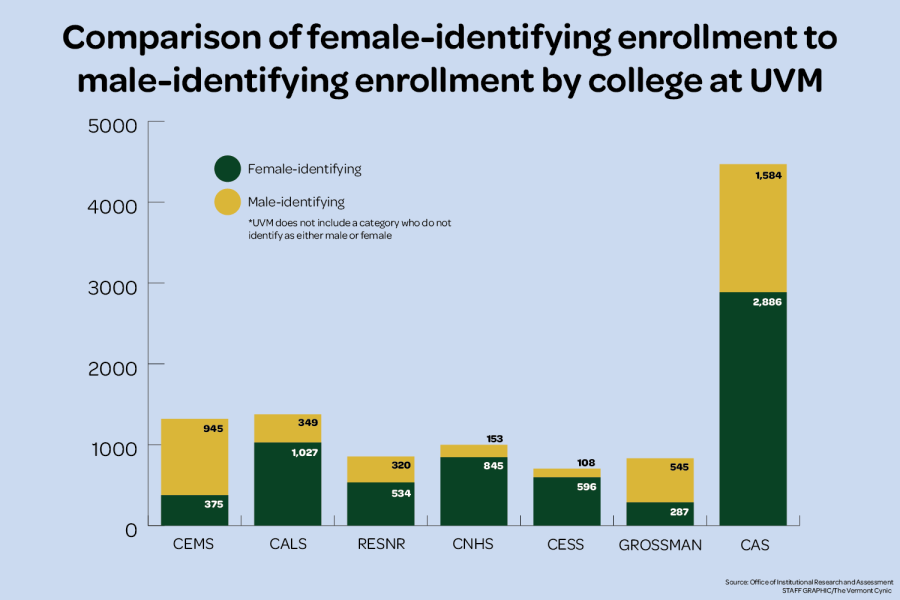Gender gaps still prevalent in CEMS
February 18, 2022
Since Ellen Hamilton and Lida Mason were the first women to graduate from UVM in 1875, there have been advancements in the gender ratios on campus but STEM fields are still unequal.
In the college of engineering and mathematical sciences, 945 students are male-identifyng and 375 are female-identifying. This makes CEMS college a male-identifying majority which is unlike any other colleges at UVM, according to UVM’s office of institutional research webpage.
UVM does not have a category in these statistics for students who identify as neither male nor female.
One of the biggest things about being a woman in STEM is dealing with imposter syndrome, said junior Jordan Allen-Brandon, treasurer for Women in STEM.
“A lot of the women I’ve talked to in my STEM classes, we’re always like ‘Are we really smart enough to be here?’ And the answer is always yes,” Allen-Brandon said.
Women are not encouraged to reach out and typically the professors are male which adds an unintentional power dynamic, she said.
“It’s intimidating, especially if you’re particularly expressive in your appearance or feminine in your appearance,” Allen-Brandon said.
This is why Allen-Brandon tries to find someone to connect with in each of her classes.
“It makes you feel more part of a community, like you’re not alone,” Allen-Brandon said. “It’s also helped me ask more questions, and to not be afraid to not get something right away and to really work through something.”
Junior Isabelle Kressy, president of Women in STEM, said she also noticed this in her computer science and math courses.
The Women in STEM club, founded in fall 2021, is one resource for female-identifying STEM students. It started because of a need for connection, Kressy said.
“I think there’s still definitely a gender gap in the STEM field between men and women,” Kressy said. “I’ve experienced it myself, just kind of feeling out of place and showing my feminine side just seems not wrong but like I don’t fit in.”
Linda Schadler, dean for the college of engineering and mathematical sciences, said in her studies as an undergraduate, she didn’t notice any challanges. When Schadler was a graduate student, however, she said it was lonely.
“There were mostly men in the department,” Schadler said. “They had a regular poker game that was men only and so I never felt a full part of the crowd.”
When she went to work in academia, Schadler said she was the first woman hired in her department.
“I just felt like I lived in a fishbowl,” Schadler said.
Not caring what other people thought was a huge help, Schadler said.
“I think that helps with resiliency in the field, if you can have enough of your own true north to ignore the rest of that,” Schadler said.
That comes, however, with a lot of privilege and a lot of family support, depending on what their life experience has been, Schadler said.
